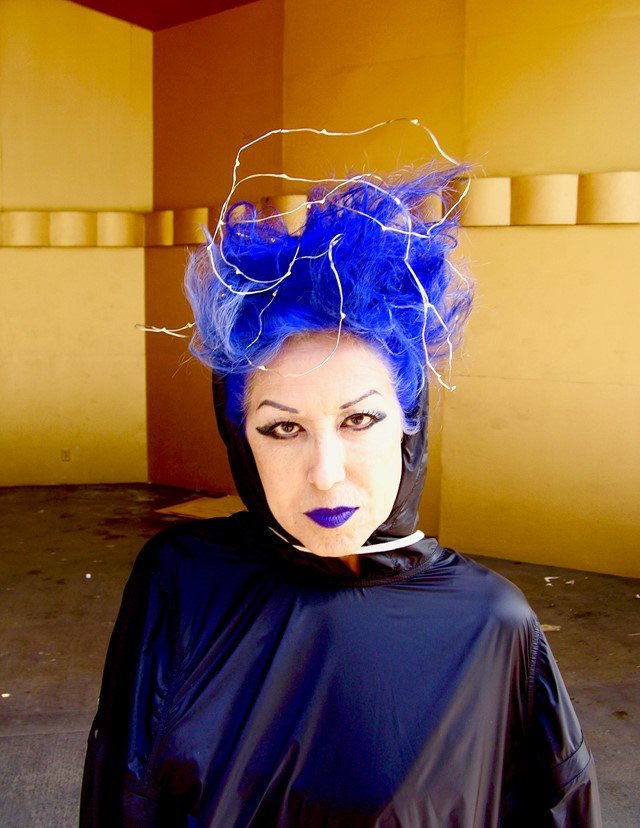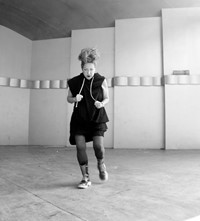LA Punk Legend Alice Bag Talks to Fetish Photographer Rick Castro
- TextRick Castro
Speaking to her ‘little brother’, Alice Bag discusses The Bags, the LA punk scene and her political new work
The phenomenon of punk rock was something to behold. From Iggy & the Stooges crowd-surfing at Cincinnati Pop Festival (1969), to The Ramones belting out Hey ho, let’s go! (1974), Patti Smith storming the stage reciting Rimbaud to the backdrop of Rock N Roll N***** (1975) – both at CBGB’s in New York – and The Sex Pistols at the Marquee, London, February 1976.
In Los Angeles, punk exploded on April 16, 1977 at the Orpheum theater on Sunset Boulevard – the line-up featured The Weirdos, The Zeros, and The Germs. I personally remember a summer night that year, creating a fishnet t-shirt riddled with safety pins, my hair spiked up with gel, and black peg-leg, skin-tight jeans. I was wearing black Capezio dance shoes because they looked closest to wingtips. Meanwhile my roomie Odessa was fashioning a dress out of a Glad trash bag. Her hair was spiked up with tin foil as a bow. She wore Charles Jordan heels with white socks over fishnet stockings. We walked down Santa Monica Boulevard to car horns blaring and curse words hurled our way. Nobody walks in LA.
Our destination was the Starwood nightclub in West Hollywood. Billed as ‘The First Punk Rock Show in LA’ with a line-up that included Devo, Butch, The Pits, The Screamers and Blondie. There were all of 30 people in the audience. Nevertheless I was hooked. The music and scene were electric.
The following week, I went to the Masque – a trashy basement off Hollywood Boulevard, which was the first exclusively punk rock club in LA. On August 28, 1977, The Bags stormed the stage, featuring lead singer Alice Bag, bass player Pat Bag, lead guitar players Craig Lee and Rob Ritter, and Terry Graham on drums – all with custom decorated paper bags on their heads. I remember like it was yesterday!
The following is a chat with my long lost punk sister, Alice Bag.
Rick Castro: Hello dear, do you remember how and where we met?
Alice Bag: I’m pretty sure it was through Vaginal Davis. I think you might have styled us when we performed as The Afro Sisters.
Rick Castro: Are you my older sister?
Alice Bag: Only when it’s convenient.
Rick Castro: Where did you grow up?
Alice Bag: I grew up in East LA.
Rick Castro: What was your childhood like?
Alice Bag: I had a pretty miserable childhood. I grew up in an abusive household where my father regularly beat my mother. Being caught in the middle of domestic violence really shaped me. I felt small and powerless as a child, consequently, as an adult I try to own my power and use it wisely.
Rick Castro: How were you introduced to punk?
Alice Bag: I don’t think we were ever formally introduced. I got into punk through what I saw as a natural progression from, or perhaps a reaction to, glam rock. While punk and glam share some similarities in that they’re both about pushing boundaries, punk was a lot more egalitarian and appealed to me because of its raw energy and lack of pretense.
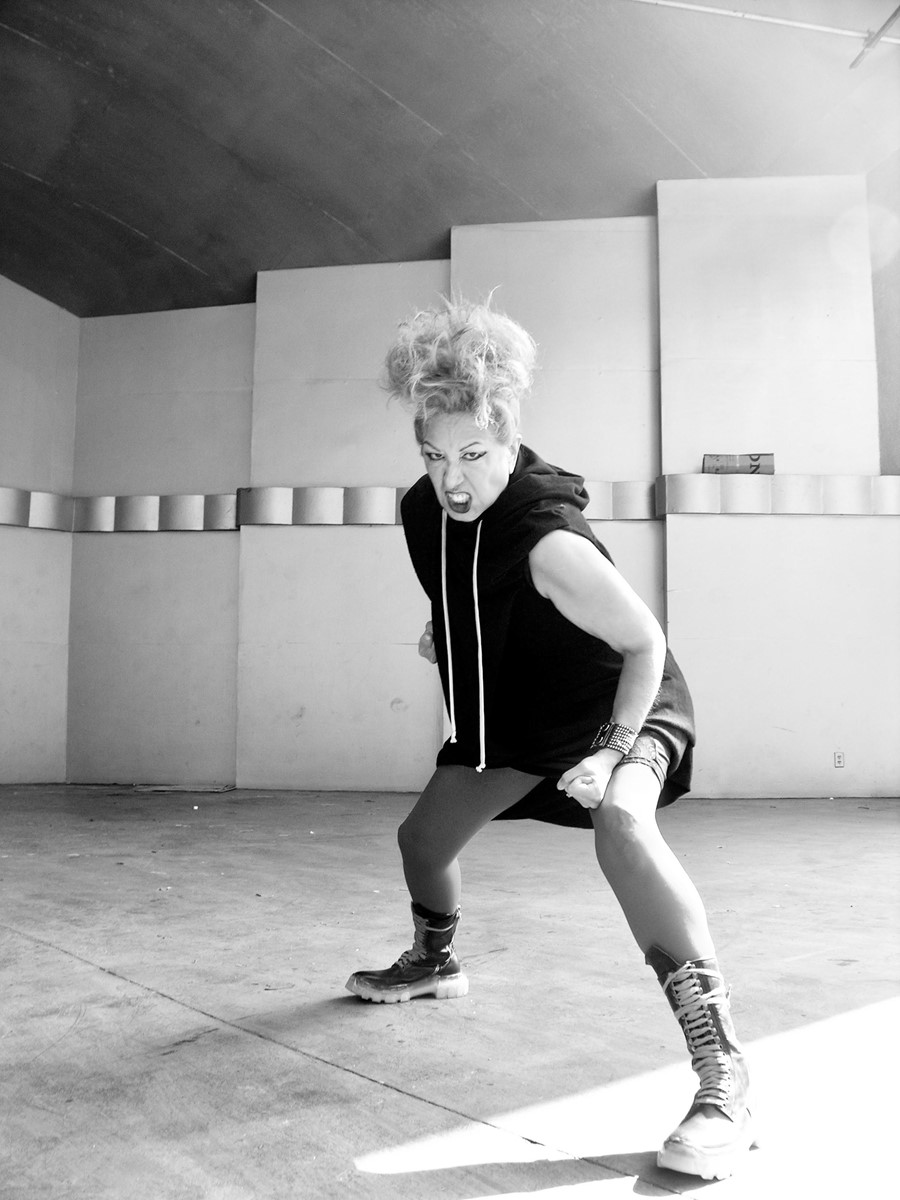
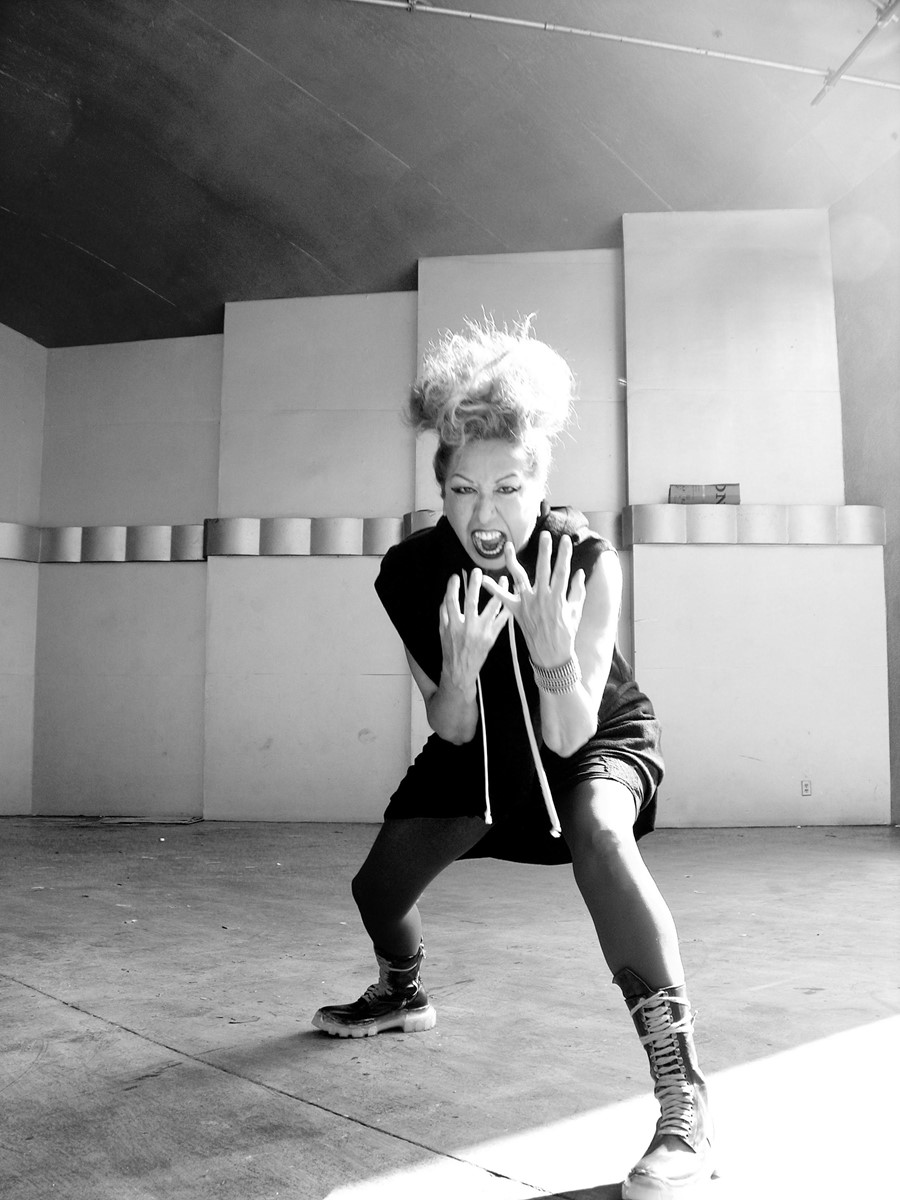
Rick Castro: How were The Bags created?
Alice Bag: My friend Patricia Morrison and I had been trying to form an all-girl glam band during the mid-1970s, but we were unsuccessful for a variety of reasons. One important reason was that we didn’t have the technical ability required to perform the type of glam we most liked (Queen or Mott the Hoople). At the time, I was dating a guy (Nickey Beat) who would become the drummer of The Weirdos. Patricia and I went to his first show with them, we had no idea that being at that event would change the course of our band and of our lives. The line-up included The Germs (who were about to play their very first show), The Zeros (a band visiting from San Diego County) and The Weirdos (a colour-splashed ensemble that mixed melody and chaos). It was an unforgettable night. I think seeing the scope of diversity, creativity and raw nerve that was presented on that stage really struck a chord with us. Patricia and I decided then and there that glam was part of the past and we vowed to form a punk band. It was that same night that Patricia had the brilliant idea that we should take brown paper grocery bags, cut out eye and mouth holes to create masks, and wear them during our set. I thought she was a genius so that is exactly what we did – we played the first few shows with bags on our heads… no easy task!
Rick Castro: You and Nickey Beat lived above the California Surplus Store, circa 1977. I was working there and remember you guys hanging out the window, waving.
Alice Bag: Nickey lived there while we were together. He had a tiny studio apartment. I spent a lot of time there but I don’t think I lived with him until we got a place together at the Canterbury.
Rick Castro: I remember him chasing you down Vine Street with only his sweatpants on. His willy looked huge! Do you care to elaborate?
Alice Bag: I will let your imagination feed your fantasies.
Rick Castro: What was your first performance like?
Alice Bag: It was crazy, I had a paper bag over my head which my friend Bobby Pyn (who would later change his name to Darby Crash) insisted on ripping away. So I had a partially torn paper bag on my face through a song or two, and the flaps of paper stuck to my sweaty face like a failed papier-mâché project. It was hard to see, remember the lyrics, and dodge Bobby while he tried to tear my mask away. Despite the mask malfunction I felt myself turning into another person onstage. It was a beautiful, horrible, chaotic release of pent up emotions. The energy poured out of me onstage and the audience responded very positively. I think it had less to do with musicality and more to do with engaging the audience. I’m pretty sure we sounded like shit.
This took place August 28, 1977, at the legendary Masque Club on Cherokee Avenue, off Hollywood Boulevard. I was in the audience. The Bags were a raw bundle of energy! The Masque is now the film and video storage basement for World of Wonder Productions, the creators of RuPaul’s Drag Race.
Rick Castro: Tell me about your legendary performance at the Troubadour.
Alice Bag: I’ve told this story too many times. I’m going to pass on this question but if you want to know the details, it’s in my book, Violence Girl.
Tom Waits was casually invited by Alice Bag. He also insulted her boyfriend, Nickey Beat, by saying, “Why are you hanging out with that dipshit?” Once onstage, Nickey said, “Tom Waits is a famous asshole.” This started a punk riot and the club was trashed. It’s an LA urban legend.
Rick Castro: Tell me about your time in the punk Hollywood golden era, 1977–79.
Alice Bag: Nickey and I got an apartment at the Canterbury. Not only was the rent cheap, but the building was a short walk to the Masque. A bunch of punks moved in, and pretty soon there were at least a dozen apartments inhabited by small groups of punks. By early fall of 1977, the Masque, a bomb shelter which had been repurposed as a rehearsal and performance space, was the epicentre of punk in LA. As is typical of youthful romances, Nickey and I broke up and I moved into another apartment with my friend Shannon Wilhelm. Shannon was a dancer. When we were at home she would delight me with her fusion of ballet and wild punk moves. Shannon would go on to form the all-female band Castration Squad and she would eventually recruit me to play bass. Living at the Canterbury was all about fast and loose creative endeavours, so there were bands that formed at the Canterbury, rehearsed once or twice, played a show at the Masque and then dissolved. It kept things fresh and exciting.
Rick Castro: It is my opinion that punk rock in LA was only good from 1977–79.
Alice Bag: I disagree, but I probably would have felt differently in 1980. Punk rock has evolved over time and there have been periods when it seemed to be dominated by aggressive, straight white male energy, but those periods didn’t last. I think women, people of colour, queers, and anyone who identified as ‘other’ were always involved. Even when bros in leather jackets were trying to push us off the dance floor, we’ve persisted. Punk has found its way back to its roots, which means inclusivity, diversity, a rejection of conservative patriarchal values and challenging the things we want changed in our world.
Rick Castro: Was the early LA punk scene diverse?
Alice Bag: Yes, it was. The early punk scene was made up of people from all over LA County, not just from Hollywood. Weirdos came from all over, outcasts from suburban neighbourhoods who felt most comfortable with other weirdos. The early punk scene was one of diversity of class, gender, ethnicity, education, religion, sexual orientation.
Rick Castro: Were you the only Latina?
Alice Bag: No, I wasn’t. There were other Latinas and Latinos, although I should mention that we didn’t always use our real names. In fact, most of us had punk names so it was sometimes difficult to make a quick assessment of someone’s ethnicity based on their last name. Also, a lot of us dyed our hair crazy colours, wore tons of extreme make-up, and wore customised thrift store clothes which made a person’s ethnicity and economic background difficult to gauge.
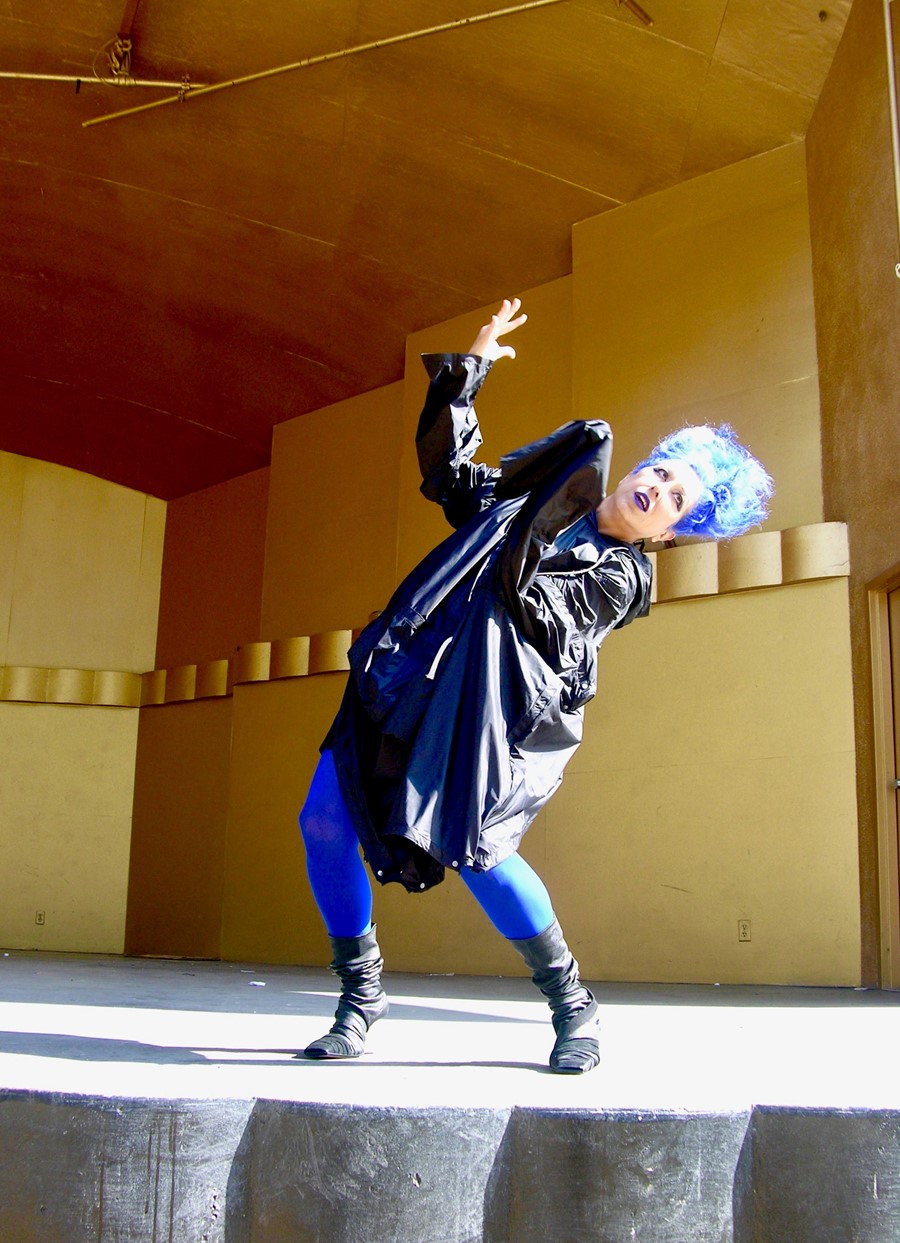
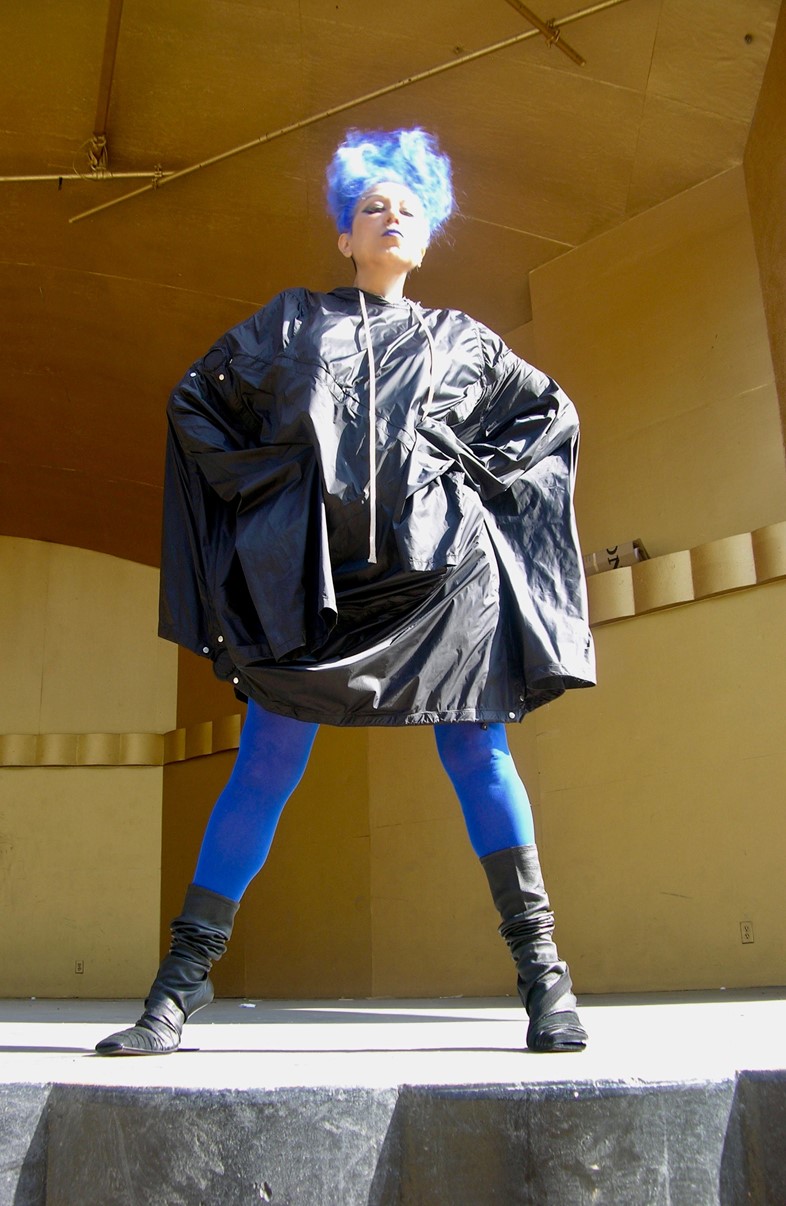
Rick Castro: What was the response to being part of Penelope Spheeris’ film, The Decline of Western Civilization?
Alice Bag: I remember that I didn’t want to be in the film, but my band really wanted to do it so I agreed. I initially had regrets but I’ve come to terms with the film. I understand its importance and I appreciate what it’s done for me.
Rick Castro: What other bands have you been in?
Alice Bag: Many bands that people have never heard of. I will name a handful just to prove my point: Castration Squad, Fun House, The Fire Engines, She-Riffs, Afro Sisters, Cholita, Las Tres, Stay at Home Bomb, and many more.
Rick Castro: Why did The Bags break up?
Alice Bag: We had a falling out with one of the founding members. Patricia quit or was fired and after that it just felt like the band was missing the glue that had held it together. Patricia had been my best friend for a few years when she left the band, so her absence was definitely the beginning of the end for The Bags.
Patricia Morrison aka Pat Bag went onto play in The Gun Club, The Sisters of Mercy and The Damned. She married lead singer Dave Vanian.
Rick Castro: Then what did you do?
Alice Bag: I moved back home and decided to finish college. At that time I wanted to be an attorney. I had a few philosophy classes under my belt and I knew I loved examining arguments. I figured that being good at argumentation would serve me well as an attorney, but I got sidetracked.
Rick Castro: Tell me about your career as a teacher.
Alice Bag: I stumbled into teaching. I was working as a teacher’s assistant while looking into graduate school. My plan was still to go to law school but once I started working with kids, I discovered that I loved it. I worked with a small group of Spanish speaking students who reminded me of myself. I felt that it was a real privilege to be able to teach students the way I wish I’d been taught.
Rick Castro: How did your book, Violence Girl, come about?
Alice Bag: I blogged it. I think if I had tried to sit down and plan to write a book I would have been overwhelmed by the task. Blogging made it ok for me to bite off smaller pieces. I wrote a blog entry every day until the book was finished. I took a very punk approach, I tried not to get too wrapped up with writing and rewriting, trying to achieve perfection; instead, as with a punk song, I made my entries short, raw and imperfect.
Rick Castro: What brought you back to music?
Alice Bag: I was invited by the band FEA to produce some songs on an album they were recording. The experience of producing somebody else’s music was inspiring. I was completely amazed that they would put that much faith and trust in me. It increased my self-confidence, made me feel competent, and reminded me that I should also be recording my own music.
Rick Castro: Your newer songs have strong political messages. Tell me about White Justice.
Alice Bag: I was going to be a part of an event celebrating the contributions of women to the Chicano Moratorium. In preparation for the event, musicians and activists got together to share and discuss the memories of elder women who had been involved in the planning of the event in 1970. I was invited to write a song based on those discussions. During a snack break, one of the elders walked up to me and reminded me that it was important not only to talk about what happened in the past, but to understand how it connects to the present. In the song, White Justice, I talk about the Chicano Moratorium but I also try to link it to what’s happening with Black Lives Matter. I feel that as people of colour we share a lot of the same experiences with institutional racism and violence against our communities. When we try to speak out against racial injustice, we are often met by an immediate backlash from the police, so what begins as peaceful protest can lead to violence and bloodshed instigated by those protecting their privilege.
Rick Castro: I love the video 77 and watched it on YouTube. (An homage to the classic 1980 film, 9 to 5). Are you aware as to how negative the comments are to your message of equal pay for women?
Alice Bag: Thank you, little brother. Yes, I am aware of all the negative comments. They are a reminder of how prevalent the problem is; they make me feel like I’m challenging a point of view that needs to be challenged. Somebody left a comment where they called me an “ugly old feminist”, and it warms my heart because it genuinely made me laugh. I can laugh because I know exactly who I am, what I look like and how much I love myself. If they had as much self-confidence as I have, they wouldn’t feel the need to tear other people down.
Rick Castro: In your opinion, who is doing something original in music?
Alice Bag: I love the band Fatty Cakes and The Puff Pastries, I recently produced their first album. If Sailor Moon and her Scouts were multi-ethnic, Antifa Amazons who played music, they would be in this band! I also adore Trap Girl. Their trans lead singer Drew Arriola has the confrontational swagger of Aileen Wuornos, gussied up like Ronnie Spector and vomiting words like Darby Crash.
Rick Castro: What’s up for 2019?
Alice Bag: I had a very bad case of pneumonia at the tail end of 2018 so I’m thrilled to start 2019 in good health. The illness forced me to slow down but it also gave me time to write some new songs, so I will be recording more music. I worked on some music with Allison Wolfe and Seth Bogart which we will self-releasing on Bandcamp. Our group went through various names, including Double Scorpio, Scorpio Scorpio and Cliquey Bitches, so unless we change our name again, one of those should lead you to our songs. I’m also working with a group of activists to amplify the voices of women in music and increase their participation. The group is called Turn It Up. Keep an eye out for us!
Rick Castro: Where will you spend your golden years?
Alice Bag: I don’t know. Life is an adventure and I want to be receptive to all my options!
Alice Bag’s new album Blue Print is out now
Rick Castro is a photographer/filmmaker, writer & blogger living in Los Angeles his entire life
STYLING Rick Castro; HAIR Steven McNicholl
